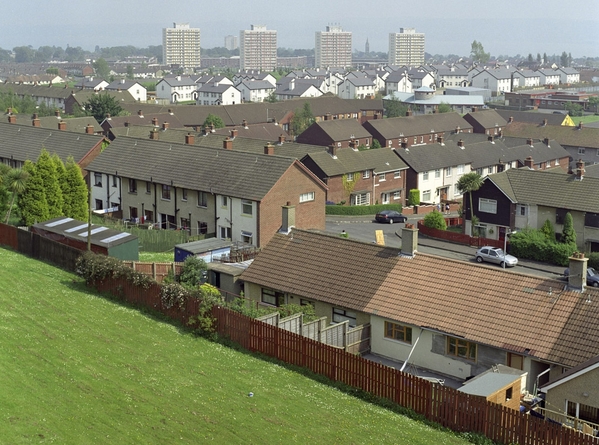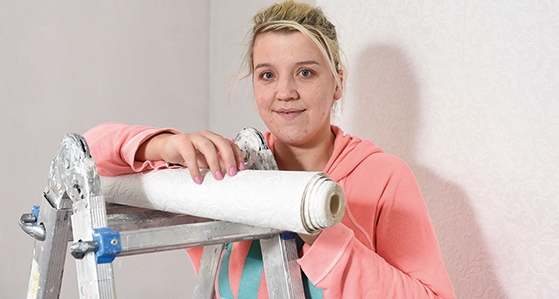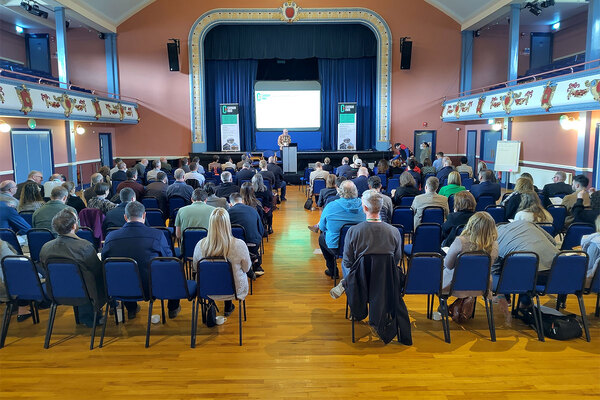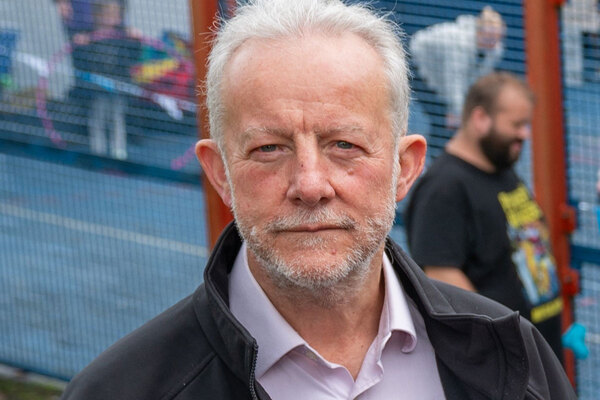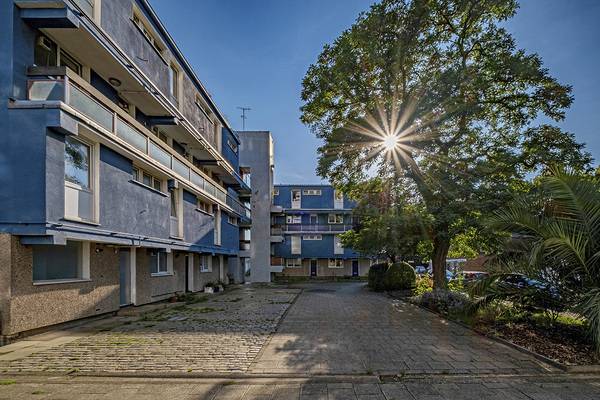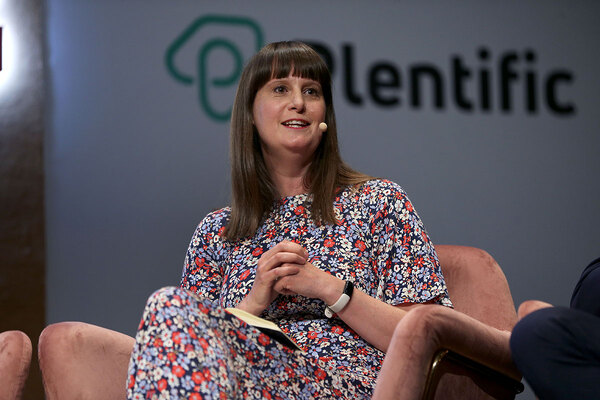You are viewing 1 of your 1 free articles
Paint job
On an estate in Northern Ireland, training female tenants in the trades is bringing residents together. Reni Eddo-Lodge finds out more
Video:
features code

The Felden Estate in Belfast hit the headlines in October, and then again in March, for all the wrong reasons.
Designed to be a mixed community where people from all backgrounds can live together, the Clanmil Housing Association development is a model of a future after sectarianism in a city where 94% of social housing is split on religious lines.
Most of the mixed schemes so far have been built in “areas that weren’t really affected by the Troubles”, explains Paddy Gray, housing professor at Ulster University. But Felden is in between White City, a Unionist area of Belfast, and Longlands, a Nationalist area.
Video:
Ad slot
After the first residents moved in, sectarian flags were erected all around the estate, and then again in the lead-up to the commemoration of the Easter Uprising, according to local paper reports. “When flags and graffiti go up, we call them chill factors. Because they disturb people. They actually intimidate people in many ways,” Mr Gray explains (although a spokesperson from Clanmil insists that the flags were already up before the housing development was built, and that national media coverage encouraged, rather than quelled, sectarian graffiti).
“I did not have the money to pay someone else to do it. I decorated the whole house by myself. ”
But inside the estate, Clanmil has been quietly working away at projects meant to help residents live together - and to help tenants of this economically deprived estate to find work. Inside Housing visited to find out if it is making a success of this endeavour in the midst of so much tension.
Building confidence
The exact form it takes today is a painting and decorating course for female tenants who are out of work.
Twenty-five-year-old Ashley is one of the tenants being trained. Inside Housing meets her on the ground floor of a draughty, freshly decorated house being used for the course, where she has just wallpapered one of the walls. So far, 29 of the 97 homes on the Felden Estate are occupied as the community beds down, so there is the opportunity for tenants to practice their decoration skills on the empty homes.
“This is my paper,” Ashley grins, gesturing to a neatly hung job decorated with a pale, small, embossed pattern.
The mother of two moved in next door to the training house in December. “I’m very proud of [my wallpaper] because it’s still up!” she laughs. The wallpapering job in question took a couple of three-hour sessions, and was completed over two days. One day this might be a living room for her future neighbour.
“Moving into a new home is expensive and I did not have the money to pay someone else to do it. After coming here I decorated the whole house by myself. It took about a weekend in total,” Ashley explains.
This painting and decorating course is part of a wider initiative called Supporting People - Empowering Communities, or SPEC for short. Clanmil’s skills and training initiative targeted at unemployed women is part of an £850,000 European Social Fund skills and employability programme, being delivered in partnership with Belfast-based training agency Women’s Tec.
Although the project is just six months old with a small number of participants so far, the aim is to run it for three years. The 10-week courses see Clanmil’s female tenants learning skills such as painting and decorating, tiling, sanding and plastering - all traditionally male pursuits. “There’s a whole industry that is entirely male-dominated,” explains Lynn Carvill, chief executive of Women’s Tec. “We are an organisation that works with women, and it’s about trying to promote balanced workforces.”

Source: Michael Cooper
Grainne is now determined to carry out all painting and decorating herself in future
It is no coincidence that this particular housing association has partnered with a women’s organisation. Of its 4,000 homes across Northern Ireland, 70% of Clanmil’s head of households are female.
Previously the housing association specialised in sheltered housing, but now builds homes for families as well, and has had to adjust its activities to meet the needs of its new tenants.
Clanmil’s community development manager Tim O’Malley explains: “Through welfare reform, women will be expected to re-enter the workplace when their youngest child is at a younger age - there’s going to be a significant pressure there.”
“Even if they don’t end up going into anything related to painting or decorating, there’s a building of confidence and a considering of opportunities that could be pursued.”
Changes to Child Tax Credit in the 2015 Budget mean that, from 2017, it will be merged into Universal Credit in the UK - including Northern Ireland. Parents who claim will be expected to look for work when their youngest child is three years old.
“There are very few options in terms of getting an alternative source of income,” Mr O’Malley continues.
But back in the training house, Ashley says she has no aspirations to become a full-time painter and decorator. “I do enjoy it. I find it really relaxing. But I don’t think I’ll do it as a profession,” she says.
Later, Mr O’Malley explains: “The fact of the matter is these programmes are about pre-employability. They’re very much the first step for people. The first step isn’t necessarily going into the workplace.”
Aiming for autonomy
The decorating course brings together women on all of Clanmil Housing’s estates, not just Felden.
The aim is economic rather than ‘community cohesion’ - helping communities live together. But Women’s Tec’s Ms Carvill is adamant that her organisation’s work is effective in bringing women together from both sides of the conflict. “There’s absolutely no doubt,” she says. “What we do, it brings women from everywhere, [and it] is that kind of nurturing, supportive female environment that belies it. And they do come together, and they do forge friendships.”
The aim is for more than 500 Clanmil women from across the housing association’s estate to go through the SPEC programme during the three-year partnership. “Many of the women we work with have come from difficult backgrounds,” adds Ms Carvill. “Relationship break-up, domestic violence, the impact of the conflict in Northern Ireland. They come onto our courses and it’s the beginning of their journey into employment and financial autonomy.”
One of those women is Grainne - Ashley’s painting and decorating partner. The 35-year-old domestic violence survivor and mother of one became a tenant of Clanmil’s Felden Estate last December. “I had a bad run with an ex, and ended up with Women’s Aid, and so it was like a good stepping stone for me to get myself back where I wanted to be,” she says.

Paddy Gray, housing professor, Ulster University: most mixed schemes built in “areas that weren’t really affected by the Troubles”
“For 16 years, I’ve always had a man in the house. My family and brothers are all 250 miles away, so I have to be self-sufficient.” She has plans to do the tiling course next. “I never ever thought I’d be doing anything manual,” she admits.
Grainne is another course attendee who doesn’t think painting and decorating could be her future career, but she’s now certain that she’ll do her own painting and decorating rather than paying for it.
Peace-building
Although Felden is an intentionally mixed community, homes on the estate are allocated by need rather than any kind of quota, using the Common Selection Scheme managed by the Northern Ireland Housing Executive. “For Felden,” says Colette Moore, Clanmil’s group director of housing, “I’m very hopeful that we will be able to establish it as a shared neighbourhood in a sustainable way, and that they will be good neighbours to each other, and that it will be a place where people can be with their families safely.” The phased population of the estate means that the homes are still being marketed to prospective tenants.
The programme has won praise from the wider housing sector as well, both for the training programme and for its broader aim of community cohesion. Mr Gray calls Clanmil’s efforts with the Felden Estate “ambitious and brave”.
Cameron Watt, chief executive of the Northern Ireland Federation of Housing Associations, calls the programme “fantastic”.
“I think it’s a really exciting and positive development,” he adds. “Northern Ireland has a long way to go in terms of breaking down barriers between communities, particularly in social housing. I think we’re only going to build a shared society if we’re able to successfully deal with that. I think that new schemes like this are a small but important part of trying to tackle segregation that still exists in social housing.
“These sorts of initiatives will help a significant number of tenants to consider opportunities around further training and employability. Even if they don’t end up going into anything related to painting or decorating, there’s a building of confidence and a considering of opportunities that could be pursued.”
While it is early days for the programme, Clanmil is confident that SPEC’s impact on women’s lives will be vast, and plans to measure it in six months. “If they’re in employment, we’ll measure that. If they’ve gone and done another course, we’ll measure that. If they go out and start to do volunteering, we’ll measure that,” says Mr O’Malley.
“A lot of this work is new,” adds Ms Moore. “Certainly, the peace-building work is really new, and there’s no template for that. So we’re very keen to learn from others, and we’re willing to share.”

